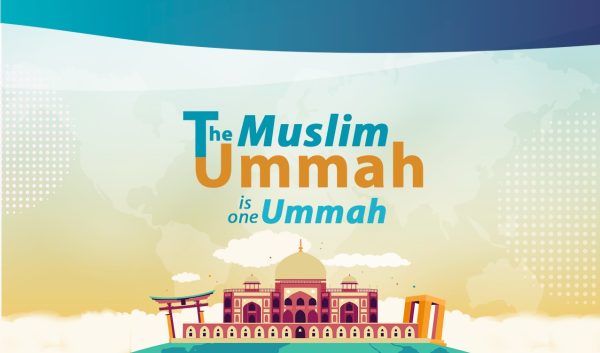
عن أبی عبد الرحمن عبداللہ بن عمر بن الخطاب رضی اللہ عنھما قال: سمعت رسول اللہ ﷺ یقول: بنی الإسلام علی خمس: شھادۃ أن لا إلٰہ إلا اللہ ،وأن محمدا رسول اللہ، وإقام الصلاۃ، وإیتائ الزکاۃ، وحج البیت، وصوم رمضان۔
On the authority of Abdullah, the son of Umar ibn al-Khattab (رَضِيَ ٱللَّٰهُ عَنْهُ), who said:
I heard the Messenger of Allah (ﷺ) say, “Islam has been built on five [pillars]: testifying that there is no deity worthy of worship except Allah (عَزَّوَجَلَّ) and that Muhammad is the Messenger of Allah (عَزَّوَجَلَّ), establishing the Salah (prayer), paying the Zakat (obligatory charity), making the hajj (pilgrimage) to the House, and fasting in Ramadan.”
(Sahih Bukhari & Muslim)
The Above hadith is mentioned in the kitab-ul-Iman of both Sahih Bukhari and Sahih Muslim.
In this hadith the Prophet ﷺ has likened Islam’s actual structure to its sensory structure so that the importance of each of these five matters can be understood perfectly. It’s a universally documented fact that buildings on this earth are founded on pillars and would disintegrate to the ground without them. Likewise, Islam has also been likened to a building, and these five matters are its pillars.
The first pillar is shahadatain meaning the two testimonies. The first testimony declares that there is no God except Allah (عَزَّوَجَلَّ) and the second one testifies that Muhammad ﷺ is the Messenger of Allah (عَزَّوَجَلَّ).
These two testimonies are in essence the real principles of our deen, in fact they are the foundations of the remaining pillars of Islam. Therefore, the health and acceptance of the other pillars and any good deed performed is dependent upon these two testimonies. No deed will be acceptable to Allah (عَزَّوَجَلَّ) unless it is founded upon “Ash hadu Al La Ilaha illa Allah wa ash hadu anna Mohammadar rasoolullah”
Also, it is vital to emphasize upon the fact that these two testimonies are correlated. Hence, ‘Ash hadu-Allah-Ilah-illal-Allah won’t be acceptable until it is combined together with “Ash hadu Anna Muhammad ar rasool ul Allah”. Likewise, “Ash hadu anna Mohammadar rasoolullah” will not be considered credible until there is a complete acceptance of “Ash hadu Alla ilaha illa Allah”.
Acceptance of “Ash hadu Alla ilaha illa Allah” demands that only Allah (عَزَّوَجَلَّ) is worshipped, and none other than Him is worshipped. And the acceptance of “Ash hadu Anna Mohammadar rassoulullah” demands that Allah (عَزَّوَجَلَّ) is worshipped in accordance to the method practiced and preached by the Prophet ﷺ. Hence there are two basic principles of worship: Firstly, that it is done purely for the sake of Allah (عَزَّوَجَلَّ) and secondly that it is done purely according to the method taught by Rasoolullah ﷺ.
Worshipping anyone other than Allah (عَزَّوَجَلَّ) is unacceptable. It is shirk (associating partners with Allah) and shirk is a sin so ghastly that it invalidates all the good deeds and condemns an individual to the torment of eternal hell-fire.
Likewise, performing worship in a manner that is different from the method taught by the Messenger ﷺ is also unacceptable. Such worship is known as “Bida’h” (innovation) and was addressed by the Prophet (peace be upon him) in every khutba of His as “sharrul umoor”, the “worst of things”. There is also a hadith in which the Prophet (peace be upon him) said:
مَنْ عَمِلَ عَمَلاً لَيْسَ عَلَيْهِ أَمْرُنَا فَهُوَ رَدٌّ
“Whoever did an action which is not upon our affair will have it rejected.”
(Sahih Muslim 30/24)
Salah is the second pillar of Islam. Mentioning of salah as the second pillar after the “shahadatain” is a testimony to its importance, value and virtue. The Prophet ﷺ stated that prayer is the pillar of this deen. He (peace be upon him) also foretold that salah will be the last thing to disappear from the ummah and that it will be the first action held accountable on the day of judgement. The Prophet ﷺ also stated clearly that prayer distinguishes a believer from a disbeliever.
The third pillar is zakat which is often mentioned alongside salah in the Quran.
وَأَقِيمُوا الصَّلَاةَ وَآتُوا الزَّكَاةَ
“And establish prayer and give zakat. “
[Al-Baqara : 43]
Zakat is a form of financial worship that purifies one’s wealth. It is an obligation that is just and full of wisdom as it benefits the poor and the downtrodden while causing no harm to the rich who have to pay a negligible amount from their vast wealth resources as zakat. Moreover, Allah (عَزَّوَجَلَّ) has promised a blessing and increment in the wealth of those who pay zakat. Allah (عَزَّوَجَلَّ) says in the Holy Quran:
يَمْحَقُ اللَّهُ الرِّبَا وَيُرْبِي الصَّدَقَاتِ
“Allah (عَزَّوَجَلَّ) will destroy Ribâ (usury) and will give increase for Sadaqât (deeds of charity, alms, etc.)”.
[Al-Baqara : 276]
يَمْحَقُ اللَّهُ الرِّبَا وَيُرْبِي الصَّدَقَاتِ
“Allah (عَزَّوَجَلَّ) will destroy Ribâ (usury) and will give increase for Sadaqât (deeds of charity, alms, etc.)”.
[Al-Baqara : 276]
مَا نَقَصَتْ صَدَقَةٌ مِنْ مَالٍ
“Wealth does not diminish by giving Sadaqah (charity)”
(Sahih Muslim : 603)
The fourth Pillar of Islam is fasting in the month of Ramadan. This is a physical form of worship that has been declared as a confidential matter between Allah (عَزَّوَجَلَّ) and His slave. No one except Allah (عَزَّوَجَلَّ) has knowledge about this act of fasting. Therefore, during Ramadan an individual might not be fasting due to a valid excuse yet other people will believe that he/she is fasting. Likewise, an individual might be observing a nafli (non-obligatory/supererogatory) fast outside the month of Ramadan and other people will have no knowledge of it. In a hadith the Prophet ﷺ said that Allah (عَزَّوَجَلَّ) multiplies the reward for every good from ten to seven hundred times. Yet, regarding fasting Allah (عَزَّوَجَلَّ) says:
الصَّوْمُ لِي وَأَنَا أَجْزِي بِهِ
“fasting is for Me, and I shall reward for it”
(Sahih Bukhari: 7538)
Meaning that the reward for fasting will be granted by Allah (عَزَّوَجَلَّ) without measure.
Although it is obvious that all deeds are for the sake of Allah (عَزَّوَجَلَّ) yet fasting is singled out in this manner precisely because it is an extremely confidential act unknown to anyone but Allah (عَزَّوَجَلَّ).
It must also be clarified that in the Hadith of Jibreel (عَلَيْهِ ٱلسَّلَامُ) fasting has been mentioned as the fourth pillar and this is the more widely known and accepted fact. In the hadith mentioned at the beginning of this article Hajj has been narrated as the fourth pillar, this sequence however is only for the sake of mention, whereby it is allowed to defer or prefer different things while mentioning them. Another hadith mentioned in sahih Muslim further clarifies this matter.
This hadith was narrated by Abdullah bin Umar (رَضِيَ ٱللَّٰهُ عَنْهُ) whereby Rasulullah ﷺ said “(The superstructure of) al-Islam is raised on five (pillars), i. e. the oneness of Allah (عَزَّوَجَلَّ), the establishment of prayer, payment of Zakat, the, fast of Ramadan, Pilgrimage (to Mecca). A person said (to Abdullah bin Umar the narrator): Which of the two precedes the other? Pilgrimage or the fasts of Ramadan? Upon this he (the narrator) replied: No (it is not the Pilgrimage first) but the fasts of Ramadan precede the Pilgrimage”.
The above-mentioned hadith makes it distinctly clear that the fasting of Ramadan has been numbered as the fourth pillar and Hajj as the fifth one. When Hazrat Abdullah narrated this hadith, a man read it in front of him and mentioned Hajj as the fourth pillar and fasting of Ramadan as the fifth. However, Hazrat Abdullah bin Umar immediately corrected him and said that the fasting of Ramadan precedes hajj and this is how I heard it from Allah’s Messenger ﷺ.
The fifth Pillar of Islam is Hajj, this is a kind of worship that consumes both the physical and financial resources. Hajj is mandatory only once in an individual’s lifetime. The virtue of performing hajj is mentioned in the following hadith:
مَنْ حَجَّ هَذَا الْبَيْتَ، فَلَمْ يَرْفُثْ وَلَمْ يَفْسُقْ، رَجَعَ كَمَا وَلَدَتْهُ أُمُّهُ
“The Messenger of Allaah ﷺ said: “Whoever performs Hajj and does not commit any obscenity [rafath] or commit any evil will go back (free of) sin as on the day his mother bore him.”
(Sahih Bukhari: 1819)
Another hadith in sahih Muslim mentions that the Prophet ﷺ said that “The performance of two Umrahs [lesser pilgrimage] expiates the sins that are committed in the interval between them, and the accepted Hajj commands no reward except Paradise”
The sequence of the afore mentioned five pillars is full if wisdom. The first one being the two testimonies which forms the basis of every action and is an obligation that must be fulfilled each and every moment of our existence. Next is salat which is obligatory five times during the day-night span and is a means of forming an immediate connection between Allah (عَزَّوَجَلَّ) and His slaves. The third pillar is zakat, which is obligatory once a year and its beneficiaries are multiple. Next comes fasting during the month of Ramadan, this is a one-month long worship that comes around once a year and its benefit is limited to the individual himself. Finally, Hajj is mentioned as the fifth pillar which is only mandatory once in an individual’s lifetime.
It must also be clarified that the hadith mentioned at the beginning was narrated by Hazrat Abdullah bin Umar as a reply to a man who had asked that will you not wage jihad? To which He narrated this hadith and the purpose was to imply the fact that jihad is not a pillar of Islam and hence is not obligatory at all times unlike the five pillars of the deen which are incumbent at all times on every individual. Jihad instead is fard kifaayah (if some people do it then the rest are absolved of responsibility, but if all of them fail to do it then all are guilty of sin).










